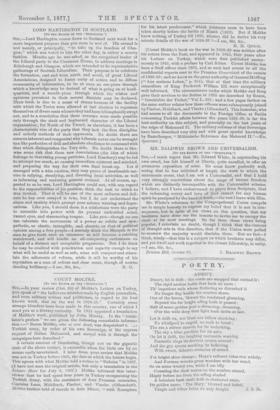COUNT T MOLTKE.
[To THE EDITOR OF THE SPECTATOR:]
your review (Oct. 20) of Moltke's Letters on Turkey, you speak of" the ludicrous mistakes made by English journalists, and even military writers and politicians, in regard to his best known work, that on the war in 1828-29." Certainly some strange blunders have been made in this country, one of which I send you as a literary curiosity. In 1854 appeared a translation of Moltko's work, published by John Murray. In the "trans- lator's preface" we are given the following remarkable informa- tion :—" Baron Moltke, who is now dead, was despatched t, Turkish army, by order of his own Sovereign, at the express request of Sultan Mahmoud, and served with it through the -campaigns here described."
A certain amount of blundering, though not on the gigantic scale of the above extract, is excusable when the facts are by no means easily ascertained. I infer from your review that Moltke was not in Turkey before 1835, the date at which the letters begin. This agrees with what' Moltke told a writer in "Daheim " in 1867. 1(1 have not seen the original article, but only a translation in the Leisure Hour for July 6, 1867.) Moltke informed this inter- viewer that he had spent four years in Turkey reorganising the ' 'Darkish Army, with the assistance of four Prussian comrades, 'Captains Lane, Mahlbach, Fischer, and Vinoke (Olbendorf). .Moltke further told of travels in Asia Minor, "with Xenophon for his latest predecessor," which journeys seem to have been taken shortly before the battle of Niesib (1839). But if Moltke knew nothing of Turkey till 1835, whence did he derive his very minute details of the war of 1828-29 ?—I am, Sir, ace., R. H. Qum.
[Count Moltke's book on tho war in 1828-29 was written after his return from the East, and appeared in 1845, four years after his Letters on Turkey, which were first published anony- mously in 1841, with a preface by Carl Ritter. Count Moltke has been a Staff officer since 1832, and as such had access to all the confidential reports sent to the Prussian Generals tab of the events of 1828-20; and we know on the great authority of General Miiffiing (" Aus meinem Leben," p. 254), that at that time the military councillors of King Frederick William III. were exceptionally well informed. The circumstances under which Moltke and Borg gave their services to the Sultan in 1835 are described by Rosen, " Geschiehte der Turkel," Vol. I., 235; and a few pages farther on the same author relates how these officers were subsequently joined by Fischer, Miihlbaeh, and Vineke (Olbendorf). This historian, who had access to all the documents in the Foreign Office at Berlin concerning Turkish affairs between the years 1825-39, is far the best authority on this subject, and generally on the last years of the reign of Mahmoud II. The military reforms of that Sovereign have been described very ably and with great special knowledge by Bastelberger, " Militiirisehe Reformen des Mahmud II."—En. Spectator.]


































 Previous page
Previous page